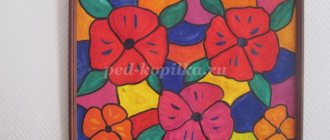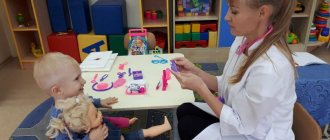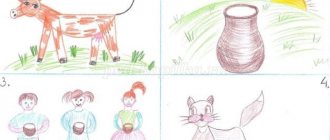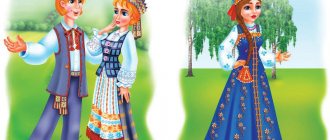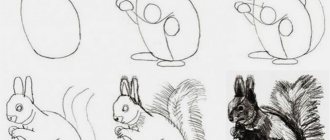Summary of the plot game “Cooking Lunch”. Lesson plan on the topic
Program content:
- Learn to name and consistently perform actions,
- clarify with the children the purpose of the dishes,
- develop initial role behavior skills,
- expand the vocabulary of “hot”, “sweet”, “serving”, “dishes” and activate their speech,
- to cultivate attentiveness, caring, a desire to take care of the doll, and a culture of behavior while eating.
Material : doll, kitchen and tableware - plates, forks, spoons, knives, cups, saucers, tablecloth, table, chairs.
Progress of the game:
Educator : Soon the doll Masha will return from a walk, she has been playing for a long time and is hungry, let's prepare her porridge and compote. But first we have to get dressed, because we are going to cook like real chefs. Aprons will prevent us from getting dirty, and scarves will prevent hair from getting into the food. (Children dress in aprons and scarves with the help of a teacher).
The teacher asks : -What dishes should I take?
Children : Pan, plate, knife, spoon, cup, board.
The teacher prepares the dishes (pot, knife, plate, cup) together with the children. Then he pours water from a bucket into a pan and puts it on the stove.
Educator : Children, what should you do with the fruit first?
Children : - Wash.
Educator : You need to wash the fruits correctly, otherwise harmful microbes will remain on them, and chop them finely. Dasha wash the fruits, and Aliya cut the fruits on the board.
Educator: What fruits did you cut?
Children : Apples, pear,
The teacher warns : - The water in the pan is already boiling, Nastya, put the fruit in the pan and stir with a spoon.
Educator : Now let’s add sugar, the compote will be tasty and sweet.
-Children, what kind of compote will it be?
Children: - delicious, sweet.
Educator : Let's taste the compote, cover the pan with a lid and let it continue to cook.
Oh, so many different things to do!
Now the compote is boiling,
And now for our doll,
We'll make some sweet porridge.
Educator : The compote is ready, put the pan aside and take out a box of cereal.
The teacher explains : - the cereal is called rice, rice porridge will be tasty, and the doll Masha will be happy.
Vosk : What kind of porridge will we cook?
Children : - Rice porridge.
The teacher pours the cereal into a plate, approaches the child and shows him the grains of rice.
Educator : - The water has already boiled, we need to wash the cereal. Alice, pour water into a small saucepan and wash the rice. Now pour the cereal into boiling water and cook the porridge.
The teacher, stirring the porridge with a spoon, says::
Yes, yes, yes - the porridge will be good.
Cook the porridge slowly.
Educator: While our porridge is being prepared, we need to set the table.
The children and the teacher set the table.
Educator : The porridge is ready, and Masha has come from a walk. Shall we feed Masha?
Children : Let's feed.
The teacher says : It’s unpleasant to eat with dirty hands, because worms can get into the tummy and Masha will get sick.
Children wash the hands of the doll Masha and sit him down at the table.
The teacher asks the children to wish the doll Masha a bon appetit. The children feed Masha, and the teacher says:
This-
Good girl
Her name is Masha!
And this is-
Her plate.
And in this plate...
No, not porridge,
No, not porridge,
And you guessed right!
Masha village,
Ate porridge-
All
How much they gave!
After lunch, the teacher invites one of the children to clear everything from the table
project “Introduction to the profession of a cook”
If the vegetable has been named correctly, the teacher leaves it on the table, and the child must say where the item should be placed - on a plate or in a vase. (If the child makes a mistake, the vegetable is put back into the bag.) Children examine the vegetable, determine its color and shape. “This is the wonderful carrot Nikita found,” says the teacher and clarifies, “what is it like?” (“Long and plump, orange,” - choral answer and 1-2 individual ones.)
Appendix No. 5
Lesson summary:
“Excursion to the kindergarten kitchen”
Purpose:
introduce children to the work of a cook, expand and consolidate knowledge about kitchen utensils.
Preliminary work:
instructing children about the rules of conduct in the kitchen.
Excursion progress:
Guys, today we will go on an excursion to the kitchen of our kindergarten, which is located on the first floor. Who can answer: what is “kitchen”? (answers)
A kitchen is a room where food is prepared. I would like to remind you once again that this is a place of increased danger, because there are hot stoves and hot food in the kitchen. Therefore, I ask you to be very careful: do not push each other, so as not to get burned on the stove or pan.
Come on in, guys, they're already waiting for us. Say hello. We are met by the main cook - Nadezhda Petrovna and her assistant Elena Petrovna
Nadezhda Petrovna, please show us your work
space.
Cook: Guys, this room is called the kitchen. Here we prepare delicious food for you every day. What did you have for breakfast today? (answers) We, the cooks, prepared the porridge. To do this, we came to kindergarten very early, when both you and your parents were still sleeping in their warm beds. I turned on the electric stove and placed a huge pan on it. Then she poured milk into the pan, poured in cereal and sugar and, stirring with a large ladle, began to cook delicious, healthy porridge for you.
Nadezhda Petrovna, please show us the dishes in which the children’s breakfast is cooked.
Here in this large saucepan our chefs cook cocoa for the children.
Children, why do you think there are such big pots in the kindergarten kitchen? (children's answers) Do you have such pans at home? (answers)
Nadezhda, what does our guys have for lunch and dinner today? (answer) What kind of kitchen utensils will be used by chefs? (answer) What other kitchen utensils do you use to prepare food?
Cook: You need different kitchen utensils. We put the washed fruits in a special basin, and at home your mother uses a small bowl or plate for this. To add water, we use a ladle, and when your junior teacher Natalya Nikolaevna arrives, using a large ladle, the cook pours borscht into the bucket for the first course. In the kitchen we need not only kitchen utensils, but also various useful appliances and accessories. We have a special electric frying pan for frying cutlets. There is a potato peeler for peeling potatoes. To strain cooked pasta, you need a large colander. There are graters in the kitchen to grate cheese or carrots for soup. And, of course, you can’t do without knives and cutting boards in the kitchen. (The story is accompanied by a show)
Article:
“Home, family”
Objectives: Encourage children to creatively reproduce family life in games. Improve the ability to independently create a game environment for a planned plot. Reveal the moral essence of the activities of adults: a responsible attitude to their responsibilities, mutual assistance and the collective nature of work.
Roles: mother, father, children, grandmother, grandfather.
Game actions: Game problem situations: “When mom and dad are not at home” (taking care of the younger ones, doing feasible homework), “We are preparing for the holiday” (joint activities with the family), “Welcoming guests” (rules for receiving guests, behavior in guests), “Our day off”, etc. Introduce elements of labor into the game: washing doll clothes, mending clothes, cleaning the room. As the game progresses, select and change toys and objects, construct a play environment using a variety of auxiliary materials, use your own homemade products, and use natural materials.
Preliminary work: Reading the story by V. Oseeva “The Magic Word” and subsequent conversation. Assignment for children: learn at home about the work of their parents. A conversation about the work of parents using illustrated material. Creation of the album “Our fathers and mothers are working.” Looking at family photos. A dramatization of S. Mikhalkov’s poem “What do you have?” Children compose stories on the topic “How I live at home.” Conversation on the topic “How I help adults” with the participation of Petrushka. Making attributes for the game with children.
Game materials: household items, dolls.
"Kindergarten"
Objectives: to expand and consolidate children’s ideas about the content of the labor actions of kindergarten employees.
Roles: teacher, junior teacher, speech therapist, head, cook, music director, physical education director, nurse, doctor, children, parents.
Game activities: The teacher receives children, talks with parents, conducts morning exercises, classes, organizes games... The junior teacher monitors order in the group, assists the teacher in preparing for classes, receives food... The speech therapist works with children on sound production, speech development... Music . the leader conducts music. class. The doctor examines the children, listens, and makes prescriptions. The nurse weighs, measures children, gives vaccinations, injections, gives pills, checks the cleanliness of groups and kitchens. The cook prepares food and gives it to the teacher's assistants.
Game situations: “Morning appointment”, “Our classes”, “On a walk”, “At a music lesson”, “At a physical education lesson”, “Doctor’s examination”, “Lunch in the kindergarten”, etc.
Preliminary work: Observation of the work of the teacher, assistant teacher. Conversation with children about the work of a teacher, assistant teacher, cook, nurse and other kindergarten workers. Excursion-inspection of the music (physical education) hall, followed by a conversation about the work of muses. manager (physical supervisor). Excursion-inspection of medical. office, observation of the doctor’s work, conversations from the personal experiences of children. Inspection of the kitchen, conversation about technical equipment that makes the work of kitchen workers easier. Game-dramatization based on N. Zabila’s poem “Yasochkin’s kindergarten” using toys. Children write stories on the topic “My best day in kindergarten.” Reading the story “Compote” by N. Artyukhova and talking about the work of those on duty. Using Petrushka, show skits on the topics “Our life in kindergarten”, “Good and bad deeds”. Selection and production of toys for the roles of muses. worker, cook, assistant teacher, nurse.
Game material: notebook for recording children, dolls, furniture, kitchen and dining utensils, cleaning kits, honey. tools, clothes for a cook, doctor, nurse, etc.
“School” Objectives: To expand children’s knowledge about school. Help children master expressive means of role implementation (intonation, facial expressions, gestures). Create your own gaming environment for your intended purpose. To contribute to the formation of the ability to creatively develop game plots. Help children learn some moral standards. Foster fair relationships. Strengthen forms of polite address. Develop friendship, the ability to live and work in a team.
Roles: students, teacher, school director, head teacher, technician.
Game actions : The teacher conducts lessons, students answer questions, tell stories, and count. The director (head teacher) is present at the lesson, makes notes in his notebook (the teacher in the role of director can call the teacher to his office and give advice), the head teacher draws up a lesson schedule. The technician monitors the cleanliness of the room and rings the bell. Learn to build a game according to a preliminary, collectively drawn up plot plan. Acting as an equal partner or performing a major (minor) role, indirectly influence changes in the gaming environment and correct gaming relationships. Encourage the construction of interconnected buildings (school, street, park), while correctly distributing the responsibilities of each participant in collective activity.
Preliminary work: Excursion to the school (inspection of the school building and school grounds, inspection of the classroom). Conversation with a 1st grade teacher. Conversation with children about the excursion. A conversation about school supplies using illustrated material. Riddles about school, school supplies. Reading to children the works of S. Marshak “The First of September”, Aleksin “The First Day”, V. Voronkova “Girlfriends Go to School”, E. Moshkovskaya “We Play School”. Memorizing poems by A. Alexandrova “To School”, V. Berestov “Counting Table”. Meeting with kindergarten graduates (organization of leisure activities). Making attributes for the game (briefcases, notebooks, baby books, schedules...)
Game materials: briefcases, books, notebooks, pens, pencils, pointer, cards, blackboard, teacher’s table and chair, globe, teacher’s magazine,
bandages for duty officers.
«Library"
Objectives: display knowledge about the surrounding life in the game, show the social significance of libraries; expand ideas about library workers, establish rules of behavior in a public place; introduce the rules for using the book; awaken interest and love for books, cultivate a caring attitude towards them.
Roles: librarian, readers.
Game activities: Registration of reader forms. Librarian accepting applications. Working with a card index. Issuance of books. Reading room.
Preliminary work: Excursion to the library followed by a conversation. Reading the work of S. Zhupanin “I am a librarian”, opening a “Book Workshop” for book repair. Making pockets in books and forms. Exhibition of drawings based on the works read.
Game material: forms, books, card index.
